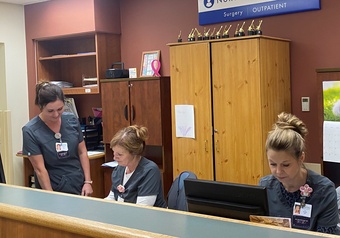Surgical

When you or a loved one needs a surgical procedure, there are plenty of questions and considerations to look at: risks of surgery, recovery time, and even simple details can become complicated. The complicated environment makes where you have your surgery one of the most important decisions you’ll make. Large centers offer various options yet miss one over-arching focus – making your surgery a personal, safe and comfortable environment. Patients requiring surgical services are in good hands at Dorminy Medical Center, where our team offers trusted, advanced and effective treatment options while ensuring quality care and a high level of skill. Our surgical team consists of Board-certified surgeons and Certified Nurse Anesthetists, state-of-the-art equipment, a professionally trained and experienced surgical team, and excellent customer service to provide exceptional, skilled and compassionate care. Following surgery, patients are monitored by our experienced nursing staff in the recovery room area until they are ready to return to their rooms.
Surgical Services include:
- Abdominal Surgery
- Amputations
- Appendectomies
- Bowel Resections
- Breast Surgery
- Cancer Surgery
- Circumcisions
- Cholecystectomies
- Colonoscopies
- Colon Surgery
- Comprehensive Wound Care
- Dialysis Access Surgery
- Dialysis Access Surgery
- Excision of Skin Lesions
- Hemorrhoid Banding
- Hemorrhoidectomy
- Hernia Repairs
- Open and Laparoscopic Procedures
- Thyroid Surgery
- Upper Endoscopies
- Vasectomies
- Vascular Access Surgery
- Vascular Ports
Ophthalmology
Cataract Surgery
We bring our personal care with a team of experts with decades of experience, and work together to help patients stay informed, comfortable and confident as we help them through this challenging time.
Hundreds choose Dorminy Medical Center surgery department each year for minor and critical surgeries in their life. Regardless the procedure chosen, Dorminy Medical Center will bring our team of doctors, nurses and technicians to help ensure every patient receives the best in quality care.
If you need surgery, you can plan on getting convenient surgical care, in a caring place, from a quality team.
Anesthesia Education
WHAT IS ANESTHESIA:
Anesthesia controls pain during surgery or other medical procedures. It includes using medications, and sometimes close monitoring, to keep you comfortable. It can also help control breathing, blood pressure, blood flow, and heart rate and rhythm, when needed. The anesthesia provider takes charge of your comfort and safety during your procedure/surgery.
WHO PROVIDES THE ANESTHESIA:
Anesthesia providers are critical members of your surgical team. They have the responsibility of monitoring your welfare when you undergo anesthesia. The primary goal of your anesthesia provider is to ensure your comfort and safety during surgery/procedure and to make informed medical judgements to protect you, such as treating and regulating changes in breathing, heart rate and blood pressure as they are affected by the procedure being performed.
WHAT ARE THE TYPES OF ANESTHESIA:
There are three main types of anesthesia: local, regional and general
- Local anesthesia numbs a small part of the body. You get a shot of medicine (anesthetic) directly into the surgical area to block pain. Local anesthesia is used only for minor procedures. You may stay awake during the procedure, or you may get medicine to help you relax or sleep.
- Regional anesthesia blocks pain to a larger part of your body. Anesthetic is injected around major nerves or the spinal cord. Like with local anesthesia, you may get medicine to help you relax or sleep when receiving regional anesthesia.
- General anesthesia affects the brain as well as the entire body. You may get it through a vein (intravenously or IV), or you may breathe it in. With general anesthesia, you are completely unaware and do not feel pain during the surgery. General anesthesia also often causes you to forget the surgery and the time immediately following surgery.
WHAT DETERMINES THE TYPE OF ANESTHESIA USED:
The type of anesthesia used depends on several things:
- Your past and current health. The surgeon and the anesthesia provider will consider other surgeries you have had and the health problems you have, such as heart disease, lung disease, or diabetes. You will also be asked whether you or any family members have had an allergic reaction to any anesthetics or other medication. This is VERY important information.
- The reason for your surgery and the type of surgery you are having.
- The results of tests, such as a blood test or an electrocardiogram (EKG…a test to look at the rhythm of your heart)
Your anesthesia provider and surgeon will collaboratively determine what type of anesthesia will be best for you during your procedure/surgery. The type of anesthesia used for any given procedure/surgery will depend on many factors and will be discussed with you prior to your procedure/surgery.
HOW TO PREPARE FOR ANESTHESIA:
Once your surgery has been planned by the surgeon, the office staff will set you up with a “preop” appointment (or preoperative interview). You will meet with a nurse and he or she will obtain a detailed medical history including any medications you take and any surgeries you have had in the past. The nurse will also advise you at this time of any prep that may or may not be required and when to stop eating or drinking prior to your surgery/procedure. It is vital that you adhere to these instructions or your surgery/procedure could be delayed or cancelled. The nurse will also advise you of any medications that should be taken or held prior to your surgery/procedure.
Anesthesia and surgery affect your entire body. Therefore, it is important for the anesthesia provider to know as much about you as possible. You will meet with the anesthesia provider immediately before your surgery/procedure. At this point, they will review your medical history and obtain a clear understanding of your needs and medical conditions. They will speak to you regarding the plan for your anesthetic needs and obtain a consent after all questions have been addressed.
DURING MY SURGERY/PROCEDURE:
Your anesthesia provider is responsible for your comfort and care during and immediately after your surgery/procedure. They will direct your anesthesia and manage your vital functions (heart rate, blood pressure, heart rhythm, body temperature and breathing) as well and monitor and manage your fluid/blood replacement when necessary. Please rest assured that your anesthesia provider is acutely aware of your health conditions and is well-prepared to treat them during your surgery/procedure and immediately afterwards.
AFTER MY SURGERY/PROCEDURE:
Right after surgery you will be taken to the recovery room. A specially trained nurse will care for you under the direction of our anesthesia provider. The nurse will check your vital signs, (including heart rate, blood pressure, O2 saturation, respiratory rate, and temperature), assess your IV sites and any bandages you may have. They will also assess your pain level and act according to the orders provided by the anesthesia provider and/or the surgeon. Other common side effects of anesthesia are closely watched and managed to reduce your discomfort. These side effects could include but are not limited to nausea/vomiting and mild drop in body temperature. You may feel cold and may shiver when you first wake up. Once you are awake and have met the criteria to leave the recovery room you will be taken to our Same Day Surgery department for discharge home or taken to an inpatient room.
ANYTHING ELSE I SHOULD KNOW:
If you are well informed and know what to expect, you will be better prepared and more relaxed for your surgery/procedure and anesthesia. Be sure to ask questions and discuss any concerns you might have with your nurse, surgeon or anesthesia provider. We are all here to help make this a wonderful experience for you. We hope that this information has helped explain the anesthesia process and give you some peace of mind. Again, we would like to thank you for choosing Dorminy Medical Center.
Contact Us

